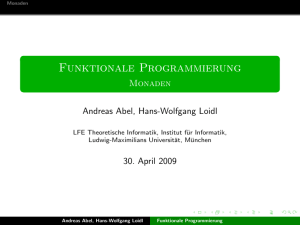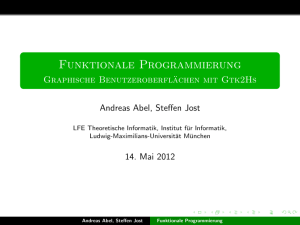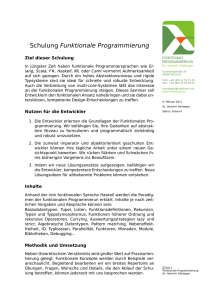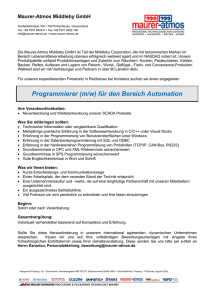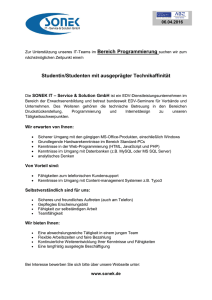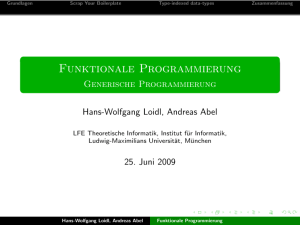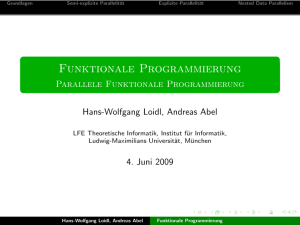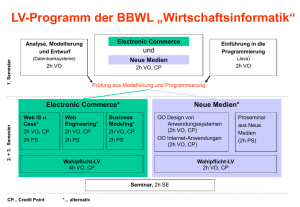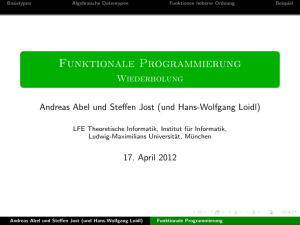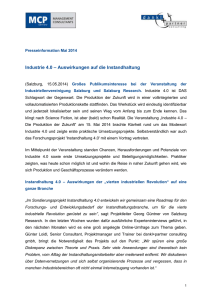Funktionale Programmierung - Graphische Benutzeroberflächen mit
Werbung
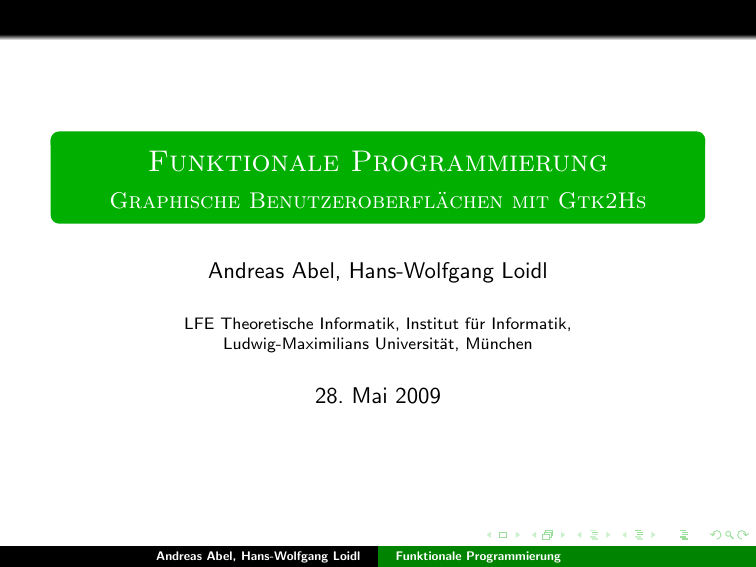
Funktionale Programmierung
Graphische Benutzeroberflächen mit Gtk2Hs
Andreas Abel, Hans-Wolfgang Loidl
LFE Theoretische Informatik, Institut für Informatik,
Ludwig-Maximilians Universität, München
28. Mai 2009
Andreas Abel, Hans-Wolfgang Loidl
Funktionale Programmierung
Hintergrund-Infos zu GTK
GTK ist Abkürzung für The GIMP ToolKit
Portable Schnittstelle für Graphische Benutzeroberflächen
(GUIs).
Komponenten:
GLib (Kernbibliothek): Kompatibilitätsschicht, Ereignisschleife,
Threads, dynamisches Laden, Objektsystem.
2 Pango: Textdarstellung, Internationalisierung.
3 Cairo: 2D Graphik auf verschiedenen Medien (Dateien,
Windows...).
4 ATK: Accessibility.
1
Andreas Abel, Hans-Wolfgang Loidl
Funktionale Programmierung
Imperative GUI-Programmierung
Benutzerinteraktion ist I/O.
Eingabe: Ereignisse (Clicks, Tastendrücke, interne
Nachrichten, Nachrichten von anderen Applikationen).
Ausgabe: Graphische Darstellung von Inhalt und Steuerung.
GUI-Programmierung ist imperativ, lebt in der IO-Monade.
Ereignisse werden durch callbacks behandelt.
In Haskell elegant gelöst mittels verzögerter Auswertung
(lazyness).
Problem: Ereignisbehandler müssen Zustand der Applikation
ändern.
Andreas Abel, Hans-Wolfgang Loidl
Funktionale Programmierung
Hello world!
import Graphics.UI .Gtk
main :: IO ()
main = do
initGUI
window ← windowNew
label
← labelNew $ Just "Hello world!"
set window [windowDefaultWidth := 200,
windowDefaultHeight := 200,
containerChild
:= label ]
onDestroy window mainQuit
widgetShowAll window
mainGUI
Andreas Abel, Hans-Wolfgang Loidl
Funktionale Programmierung
Initialisierung und Ereignisschleife
module Graphics.UI .Gtk.General.General where
initGUI :: IO [String ]
-- Initialize GUI toolkit and parse Gtk specific arguments.
-- The remaining arguments are returned.
mainGUI :: IO () -- Run the Gtk+ main event loop.
mainQuit :: IO () -- Exit the main event loop.
Andreas Abel, Hans-Wolfgang Loidl
Funktionale Programmierung
Widget (wiktionary.org)
Widget
Blend of window and gadget, coined by George S.
Kaufman in his play Beggar on Horseback (1924).
1
A small scraping tool consisting of a blade and a handle,
commonly used to remove paint from glass and other smooth
surfaces. (Spachtel)
2
A floating widget or other device inside a beer can, meant to
create foam when opened.
3
An unnamed, unspecified, or hypothetical manufactured good
or product. (Dingsbums, Vorrichtung)
4
An object of fiction or obfuscation (Gigawidget).
5
A component of a graphical user interface that the user
interacts with.
Andreas Abel, Hans-Wolfgang Loidl
Funktionale Programmierung
Attribute lesen und schreiben
module System.Glib.Attributes where
data ReadWriteAttr o a b
data AttrOp o = forall a b.(:=) (ReadWriteAttr o a b) b
| ...
get :: o → ReadWriteAttr o a b → IO a
set :: o → [AttrOp o ] → IO ()
Beispiele:
value ← get button buttonLabel
set button [buttonLabel := value, buttonFocusOnClick := False ]
AttrOp o ist ein existentieller Datentyp. Für einen Bewohner
attr := value :: AttrOp o gibt es zwei Typen a, b, so dass
attr :: ReadWriteAttr o a b und value :: b. Das forall kommt von
(:=) :: forall a b.ReadWriteAttr o a b → b → AttrOp o.
Andreas Abel, Hans-Wolfgang Loidl
Funktionale Programmierung
Widgets
module System.Glib.Signals where
data ConnectId o
-- If you ever need to disconnect a signal handler then you will
-- need to retain the ConnectId you got when you registered it.
disconnect
:: GObjectClass obj ⇒ ConnectId obj → IO ()
module Graphics.UI .Gtk.Abstract.Widget where
widgetShowAll :: WidgetClass self ⇒ self → IO ()
-- Recursively shows a widget, and any child widgets.
onDestroy
:: WidgetClass w ⇒ w → IO () → IO (ConnectId w )
Andreas Abel, Hans-Wolfgang Loidl
Funktionale Programmierung
Packen und Quetschen
Horizontal packen.
module Graphics.UI .Gtk.Layout.HBox where
hBoxNew :: Bool -- True if all children given equal space.
→
Int
-- number of pixels between children.
→
IO HBox
module Graphics.UI .Gtk.Abstract.Box where
data Packing = PackGrow -- widget grows with box: text area
| PackRepel -- only padding grows: dialog box
| PackNatural -- stay where you are: menu bar
boxPackStart :: (BoxClass self , WidgetClass child) ⇒
self → child →
Packing → Int → IO ()
-- Int is extra padding
Vertikal packen analog mit vBoxNew .
Andreas Abel, Hans-Wolfgang Loidl
Funktionale Programmierung
Horizontale Packung am Beispiel
main = do
initGUI
window ← windowNew
hbox
← hBoxNew True 10
button1 ← buttonNewWithLabel "Button 1"
button2 ← buttonNewWithLabel "Button 2"
set window [windowDefaultWidth := 200,
windowDefaultHeight := 200,
containerBorderWidth := 10,
containerChild
:= hbox ]
boxPackStart hbox button1 PackGrow 0
boxPackStart hbox button2 PackGrow 0
...
Andreas Abel, Hans-Wolfgang Loidl
Funktionale Programmierung
Schachbretter und Tabellenlayouts
module Graphics.UI .Gtk.Layout.Table where
tableNew :: Int
-- number of rows
→ Int
-- number of columns
→ Bool
-- homogeneous size?
→ IO Table
tableAttachDefaults :: (TableClass self , WidgetClass widget)
⇒ self → widget -- table, child
→ Int → Int
-- left and right column to attach
→ Int → Int
-- top and bottom row to attach
→ IO ()
Andreas Abel, Hans-Wolfgang Loidl
Funktionale Programmierung
Beispiel für Tabellenlayout
createButton :: Table → (Int, Int) → IO Button
createButton table (x, y ) = do
b ← buttonNew
onClicked b (buttonPress (x, y ))
tableAttachDefaults table b x (x + 1) y (y + 1)
return b
main = do ...
table ← tableNew ysize xsize True
let rows = [[(x, y ) | x ← [0 . . xsize − 1]] | y ← [0 . . ysize − 1]]
buttons ← mapM (mapM (createButton table)) rows
...
mapM :: Monad m ⇒ (a → m b) → [a] → m [b ]
-- from Prelude or Control.Monad
Andreas Abel, Hans-Wolfgang Loidl
Funktionale Programmierung
“Globale” Variablen und IORef
Simulation globaler Variablen mittels Record, z.B.
data GlobVar = GlobVar {ro1 :: Int
, ro2 :: [(Int, Int)]
, rw1 :: IORef Int
, rw2 :: IORef [IORef [Int ]]}
func1 :: GlobVar → Int → IO [Int ]
func2 :: GlobVar → a → IO a
Jede Funktion erhält GlobVar als Parameter. Veränderbare Var.:
module Data.IORef where
data IORef a
newIORef :: a
→
IO (IORef a)
readIORef :: IORef a →
IO a
writeIORef :: IORef a → a → IO ()
Andreas Abel, Hans-Wolfgang Loidl
Funktionale Programmierung
Beispielapplikation: Tic Tac Toe
Erstelle 9 Buttons, ohne Label.
Klick auf Button ist Zug des menschlichen Spielers.
Ereignisbehandlung setzt Label und berechnet Antwort des
Computerspielers.
Muss auch Zustand des Buttons der Antwort ändern.
Ereignisbehandlung eines Buttons braucht Zugriff auf alle
Buttons.
Lösung: Erstelle zuerst Buttons, installiere dann
Ereignisbehandlung für alle.
Kann man die Ereignisbehandlung auch bei der Erstellung
einhängen?
Andreas Abel, Hans-Wolfgang Loidl
Funktionale Programmierung
Beispielapplikation: Tic Tac Toe
Erstelle 9 Buttons, ohne Label.
Klick auf Button ist Zug des menschlichen Spielers.
Ereignisbehandlung setzt Label und berechnet Antwort des
Computerspielers.
Muss auch Zustand des Buttons der Antwort ändern.
Ereignisbehandlung eines Buttons braucht Zugriff auf alle
Buttons.
Lösung: Erstelle zuerst Buttons, installiere dann
Ereignisbehandlung für alle.
Kann man die Ereignisbehandlung auch bei der Erstellung
einhängen?
Idee: Zirkuläres Programm.
Andreas Abel, Hans-Wolfgang Loidl
Funktionale Programmierung
Versuch einer zirkulären Konstruktion
data State
-- Tic Tac Toe board
data App = App {stateRef :: IORef State
, buttons :: [[Button ]]} -- global vars of appl.
buttonPress :: App → (Int, Int) → IO () -- button event handler
createButton :: App → Table → (Int, Int) → IO Button
createButton app table (x, y ) = do
b ← buttonNew
onClicked b (buttonPress app (x, y ))
tableAttachDefaults table b x (x + 1) y (y + 1)
return b
let app = App {
stateRef = newIORef initialState,
buttons = map (map (createButton app table)) rows }
-- DOES NOT WORK: createButton is monadic!
Andreas Abel, Hans-Wolfgang Loidl
Funktionale Programmierung
Zirkuläre monadische Programme
Monadische Rekursion:
module Control.Monad.Fix where
class Monad m ⇒ MonadFix m where
mfix :: (a → m a) → m a
instance MonadFix IO
Den Knoten zuziehen (tying the knot):
do app ← mfix $ λapp 0 →
do bs ← mapM (mapM (createButton app 0 table)) rows
return $ App {stateRef = ...
, buttons = bs
}
Andreas Abel, Hans-Wolfgang Loidl
Funktionale Programmierung
Recursives do
do app ← mfix $ λapp 0 →
do bs ← mapM (mapM (createButton app 0 table)) rows
return $ App {stateRef = ...
, buttons = bs
}
Mit GHC-Spracherweiterung (Flag -XRecursiveDo oder gleich
-fglasgow-exts):
{-# OPTIONS -XRecursiveDo #-}
mdo bs
← mapM (mapM (createButton app table)) rows
let app = App {stateRef = ...
, buttons = bs
}
return app
Andreas Abel, Hans-Wolfgang Loidl
Funktionale Programmierung
Menü und Werkzeugleiste
Menü, Werkzeugleisten und Tastenkombinationen starten
Actions.
Aktionen können aktiviert und deaktiviert werden.
actionNew ::
String
-- name : unique name for the action
→ String
-- label : displayed in menu items and on butto
→ Maybe String -- tooltip
→ Maybe String -- stockId : icon to be displayed
→ IO Action
onActionActivate :: ActionClass self ⇒ self → IO () →
IO (ConnectId self )
actionSetVisible :: ActionClass self ⇒ self → Bool → IO ()
actionSetSensitive :: ActionClass self ⇒ self → Bool → IO ()
Andreas Abel, Hans-Wolfgang Loidl
Funktionale Programmierung
XML Menübeschreibung
uiDecl = ""
"<ui>"
" <menubar>"
"
<menu action=\"FILE_MENU\">"
"
<menuitem action=\"QUIT\"/>"
"
</menu>"
" </menubar>"
" <toolbar>"
"
<toolitem action=\"QUIT\"/>"
" </toolbar>"
"</ui>"
Andreas Abel, Hans-Wolfgang Loidl
Funktionale Programmierung
createMenu :: VBox → IO ()
createMenu box = do
actFileMenu ← actionNew "FILE_MENU" "File" Nothing Nothing
actQuit ← actionNew "QUIT" "Quit"
(Just "Exit Tic Tac Toe") (Just stockQuit)
onActionActivate actQuit mainQuit
actGroup ← actionGroupNew "ACTION_GROUP"
mapM (actionGroupAddAction actGroup) [actFileMenu, actQuit ]
ui ← uiManagerNew
uiManagerAddUiFromString ui uiDecl
uiManagerInsertActionGroup ui actGroup 0
Just menubar ← uiManagerGetWidget ui "/ui/menubar"
boxPackStart box menubar PackNatural 0
Just toolbar ← uiManagerGetWidget ui "/ui/toolbar"
boxPackStart box toolbar PackNatural 0
Andreas Abel, Hans-Wolfgang Loidl
Funktionale Programmierung
Ressourcen
GTK+ Projekt: http://www.gtk.org/
gtk2hs Homepage: http://haskell.org/gtk2hs/.
gtk2hs Tutorial:
http://home.telfort.nl/sp969709/gtk2hs/
Sprung in Referenz:
http://haskell.org/hoogle/3/?package=gtk.
Mac Installation:
http://www.haskell.org/haskellwiki/Gtk2Hs, positiv
getestet!
Ubuntu Hardy (8.04) mit ghc-6.8.2 und gtk2hs-0.9.13:
http://www.mickinator.com/wordpress/?p=31
Andreas Abel, Hans-Wolfgang Loidl
Funktionale Programmierung
